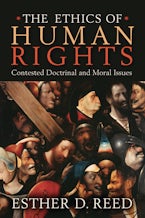
The Ethics of Human Rights
Contested Doctrinal and Moral Issues
Imprint: Baylor University Press
Sales Date: 2007-09-04
225 Pages, 6.00 x 9.00 x 0.66 in

Imprint: Baylor University Press
Sales Date: 2007-09-04
225 Pages, 6.00 x 9.00 x 0.66 in